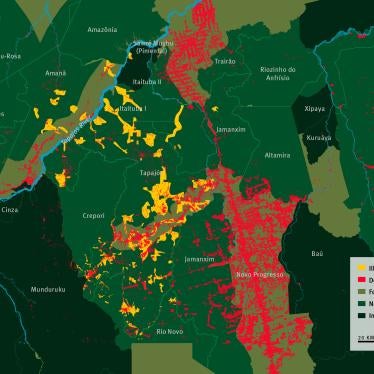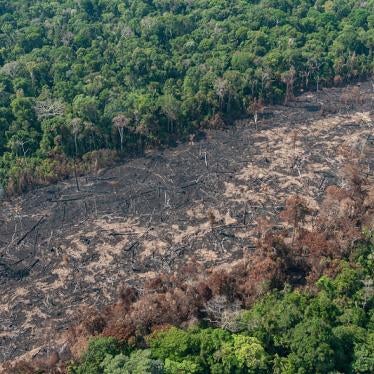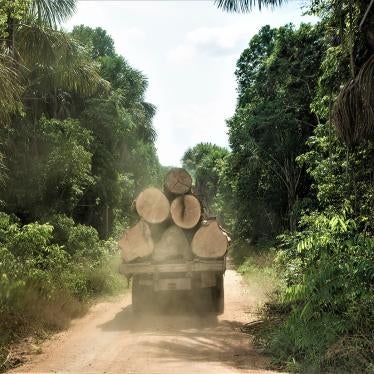Dear President of the National Indian Foundation (FUNAI) Marcelo Augusto Xavier,
I write on behalf of Human Rights Watch to respectfully urge you to revoke Resolution n° 4/2021, adopted by the National Indian Foundation (FUNAI) on January 26, which states, among other provisions, that the recognition of an individual by an ethnic group should be consistent with “a definition based on technical/scientific criteria.”[1] It is our assessment that the Resolution contravenes international human rights obligations both in the manner in which it was enacted and in its content.
Human Rights Watch is an international nongovernmental organization that investigates and reports on human rights abuses around the world. In conducting our research in different countries, we apply international treaties currently in force in this field, and work with governments and civil society to uphold human rights and the rule of law.
As you know, Supreme Court Justice Luis Roberto Barroso suspended the effects of the Resolution on March 16, arguing that its provisions are unconstitutional.[2] The then Solicitor General challenged this suspension on procedural grounds. If his challenge succeeds, the resolution will go into effect. Rather than await a final ruling, FUNAI should revoke the Resolution once and for all and communicate with the Solicitor’s General Office so that it drops its challenge.
The resolution is objectionable for several reasons. First, it was enacted by FUNAI without properly consulting the communities concerned. The UN Declaration on the Rights of Indigenous Peoples requires states to consult with the Indigenous peoples concerned in order to obtain their free, prior and informed consent before adopting and implementing legislative or administrative measures that may affect them.[3]
Second, the resolution establishes an arbitrary criterion for identifying who is Indigenous that is inconsistent with international human rights standards. The International Labor Organization’s Convention 169, which Brazil ratified in 2002, provides that a group’s self-identification as Indigenous shall be regarded as a fundamental criterion for determining whether the Convention applies.[4]
The United Nations Declaration on the Rights of Indigenous Peoples – which Brazil voted in favor of at the UN General Assembly – provides that Indigenous people and individuals have the right to belong to an Indigenous community in accordance with the traditions and customs of the community or nation concerned, and that Indigenous peoples have the right to determine their own identity or membership in accordance with their customs and traditions.[5]
With regard to membership, the Inter-American Court of Human Rights has found that “the identification of the Community, from its name to its membership, is a social and historical fact that is part of its autonomy”, and that “the Court and the State must restrict themselves to respecting the corresponding decision made by the Community.”[6] Similarly, The Inter-American Commission on Human Rights (IACHR) “regards the criterion of self-identification as the principal one for the recognition of a human group as an Indigenous people in both an individual and a collective sense.”[7]
These international norms are reflected in Brazil’s Constitution, which recognizes the right of Indigenous people to have their social organization, customs, languages, creeds and traditions recognized, as well as their original rights to the lands they traditionally occupy.[8]
In the past, FUNAI had regarded a group’s self-identification as Indigenous and its recognition of an individual as a member of the group as the fundamental criteria to define who is Indigenous in Brazil.[9] The agency also recognized that “it is not for the State to recognize who is or is not Indigenous, but to ensure that the individual and social processes of construction and formation of ethnic identities are respected”, based on Brazil’s obligations under ILO Convention 169.[10]
Resolution n° 4/2021 contradicts the agency’s own preceding understanding on membership in an Indigenous community and violates international law.[11] By establishing that recognition of an individual by an ethnic group should be consistent with “a definition based on technical/scientific criteria,” as well as other criteria, the resolution violates Indigenous peoples’ right to autonomously determine their membership. The language also suggests that there is something “scientifically” measurable or distinct about Indigenous peoples, a degrading notion reminiscent of colonial theories on racial inferiority.
Moreover, we are concerned that this vague criterion could be used by FUNAI in the future to arbitrarily narrow the definition of who is Indigenous and restrict their access to policies designed to uphold and protect their rights to land and access to health care, for example.
The adoption of this resolution is particularly troubling in the context of an administration that has relentlessly sought to weaken Indigenous peoples’ rights and the protection of their territories in Brazil. Since President Jair Bolsonaro took office in 2019, the federal government has not demarcated any new Indigenous territories, even though the constitution requires it to demarcate and protect such territories.[12] FUNAI has also made decisions that might run against its mandate to uphold and protect the rights of Indigenous peoples in Brazil.
In April 2020, FUNAI issued normative instruction n° 9/2020 enabling individuals to obtain certification of private properties in Indigenous areas awaiting demarcation, which could fuel illegal or irregular land acquisitions and undermine the recognition of Indigenous territorial rights, according to federal prosecutors.[13] They have challenged the normative instruction and have been able to suspend its effects in several Brazilian states.[14]
FUNAI and the Brazilian Institute of the Environment and Renewable Natural Resources (IBAMA) also issued joint normative instruction n° 01/2021, which may open doors to businesses, such as farming enterprises, on Indigenous territories in partnership with non-Indigenous people.[15] Federal prosecutors from the state of Mato Grosso have requested clarification from these federal agencies, citing the constitutional provision that “lands traditionally occupied by Indians are intended for their permanent possession and they shall have the exclusive usufruct of the riches of the soil, the rivers and the lakes existing therein”.[16]
Since 2019, illegal incursions and environmental destruction in Indigenous territories have greatly increased, encouraged by these actions by FUNAI and other measures by the Bolsonaro administration that have undermined protection of these territories.
In 2019, there was a 135 percent increase in illegal invasions, illegal logging, irregular land acquisitions, and other infringement upon Indigenous areas, according to the non-profit organization Indigenist Missionary Council (CIMI) – which has historically worked for the protection of Indigenous rights in Brazil and compiled cases of violence against Indigenous people nationwide.[17]
For all the reasons above, Human Rights Watch urges FUNAI to accept the Supreme Court’s order and immediately revoke the Resolution, as well as communicate with the Solicitor General's office so that it withdraws its appeal.
Thank you for your attention to this very important matter.
Sincerely,
[1] FUNAI Resolution n° 4, January 22, 2021, https://www.in.gov.br/en/web/dou/-/resolucao-n-4-de-22-de-janeiro-de-2021-300748949 (accessed February 24, 2021)
[2] “Barroso homologa parcialmente plano do governo federal para conter Covid-19 entre indígenas,” Supremo Tribunal Federal, March 03, 2021, http://portal.stf.jus.br/noticias/verNoticiaDetalhe.asp?idConteudo=462365&ori=1 (accessed March 31, 2021)
[3] United Nations Declaration on the Rights of Indigenous Peoples, Art. 19, https://www.un.org/development/desa/indigenouspeoples/wp-content/uploads/sites/19/2018/11/UNDRIP_E_web.pdf (accessed February 24, 2021)
[4] ILO Indigenous and Tribal Peoples Convention, 1989 (No. 169), Art. 1, https://www.ilo.org/dyn/normlex/en/f?p=NORMLEXPUB:12100:0::NO::P12100_ILO_CODE:C169 (accessed February 24, 2021). The American Declaration on the Rights of Indigenous Peoples, adopted by acclamation in 2016, also provides that states “shall respect the right to such self-identification as indigenous, whether individually or collectively, in keeping with the practices and institutions of each indigenous people.” See American Declaration on the Rights of Indigenous Peoples, Art. 1(2), https://www.oas.org/en/sare/documents/DecAmIND.pdf; and “OEA aprova Declaração Americana sobre os Direitos dos Povos Indígenas,” FUNAI, June 28, 2021, www.funai.gov.br/index.php/comunicacao/noticias/3815-oea (accessed February 24, 2021)
[5] United Nations Declaration on the Rights of Indigenous Peoples, Art. 9 and 33(1), https://www.un.org/development/desa/indigenouspeoples/wp-content/uploads/sites/19/2018/11/UNDRIP_E_web.pdf (accessed February 24, 2021)
[6] I/A Court H.R., Case of the Xákmok Kásek Indigenous Community v. Paraguay, Merits, Reparations, and Costs, Judgment of August 24, 2010. Series C No. 214, para. 37, https://www.corteidh.or.cr/corteidh/docs/casos/articulos/seriec_214_ing.pdf
[7] IACHR, “Situation of Human Rights of the Indigenous and Tribal Peoples of the Pan-Amazon Region,” 2019, paragraphs 21, 29, https://www.oas.org/en/iachr/reports/pdfs/panamazonia2019-en.pdf (accessed February 24, 2021)
[8] Brazil’s Federal Constitution, art. 231.
[9] FUNAI, “Quais os critérios utilizados para a definição de indígena?,” http://www.funai.gov.br/index.php/todos-ouvidoria/23-perguntas-frequentes/97-pergunta-3 (accessed February 24, 2021)
[10] Ibid.
[11] Decree n° 9.010/2017
[12] Daniel Biasetto, “Sob Bolsonaro, Funai e Ministério da Justiça travam demarcação de terras indígenas,” O Globo, January 3, 2021, https://oglobo.globo.com/brasil/sob-bolsonaro-funai-ministerio-da-justica-travam-demarcacao-de-terras-indigenas-24820597 (accessed January 25, 2021); Constitution of the Federative Republic of Brazil, 1988, art. 231, http://www.stf.jus.br/arquivo/cms/legislacaoConstituicao/anexo/brazil_federal_constitution.pdf (accessed June 22, 2019).
[13] Normative Instruction n°9/2020, https://www.in.gov.br/web/dou/-/instrucao-normativa-n-9-de-16-de-abril-de-2020-253343033; and Ministério Público Federal em Mato Grosso, “IN 9: Justiça acata pedido do MPF e determina que Funai comprove cumprimento de liminar em cinco dias,” http://www.mpf.mp.br/mt/sala-de-imprensa/noticias-mt/ino-09-justica-acata-pedido-do-mpf-e-determina-que-funai-comprove-cumprimento-de-liminar-em-cinco-dias (accessed March 1, 2021)
[14] Ibid.
[15] Rubens Valente, “Instrução do governo abre espaço para fazendeiros em terras indígenas,” UOL, February 25, 2020, https://noticias.uol.com.br/colunas/rubens-valente/2021/02/24/portaria-funai-empreendimentos-indigenas.htm; Normative Instruction n° 1/2021, https://www.in.gov.br/en/web/dou/-/instrucao-normativa-conjunta-n-1-de-22-de-fevereiro-de-2021-304921201 (accessed March 1, 2021)
[16] Ministério Público Federal em Mato Grosso, “MPF pede explicações a Funai e Ibama sobre instrução normativa que trata da exploração de terras indígenas,” http://www.mpf.mp.br/mt/sala-de-imprensa/noticias-mt/mpf-pede-explicacoes-a-funai-e-ibama-sobre-instrucao-normativa-que-trata-da-exploracao-de-terras-indigenas (accessed March 3, 2021).
[17] Rubens Valente, “Invasões em terras indígenas sobem 135% no 1º ano de Bolsonaro, diz Cimi,” UOL, September 30, 2020, https://noticias.uol.com.br/colunas/rubens-valente/2020/09/30/indigenas-relatorio-violencia-brasil-governo-bolsonaro.htm (accessed January 26, 2021).








